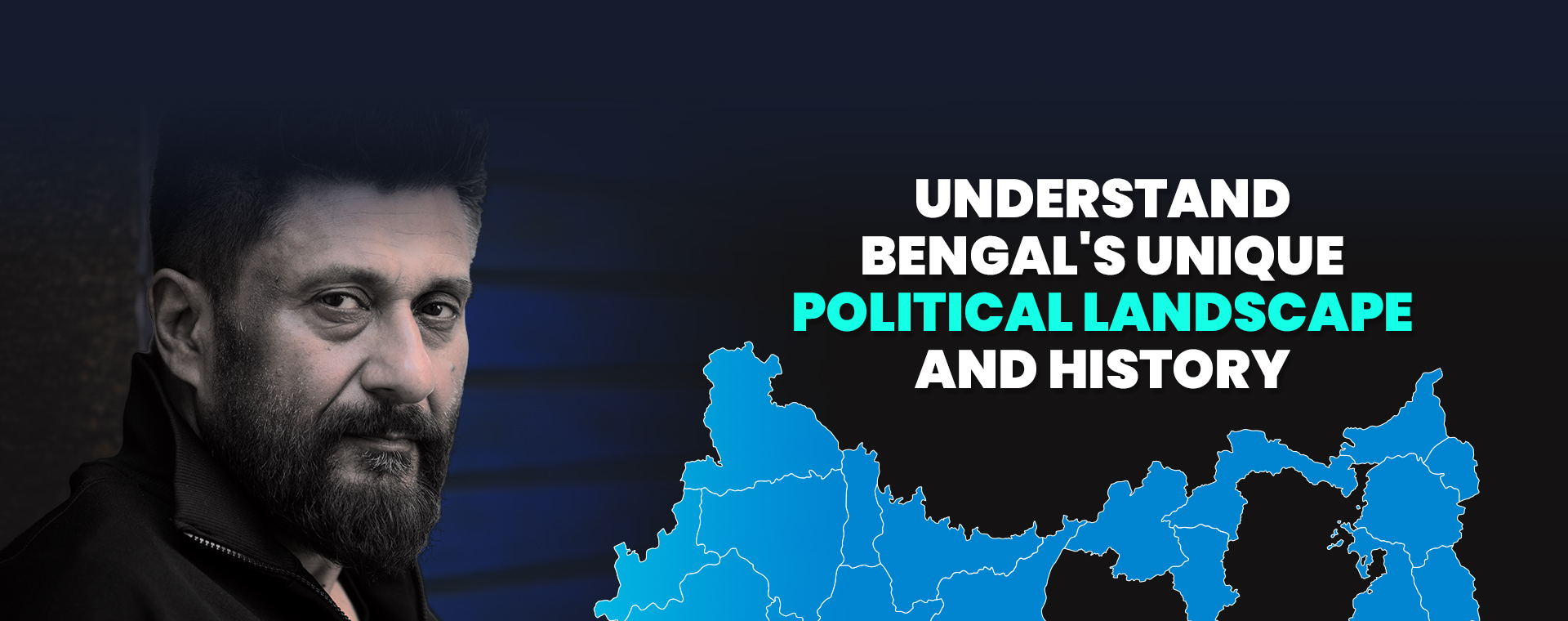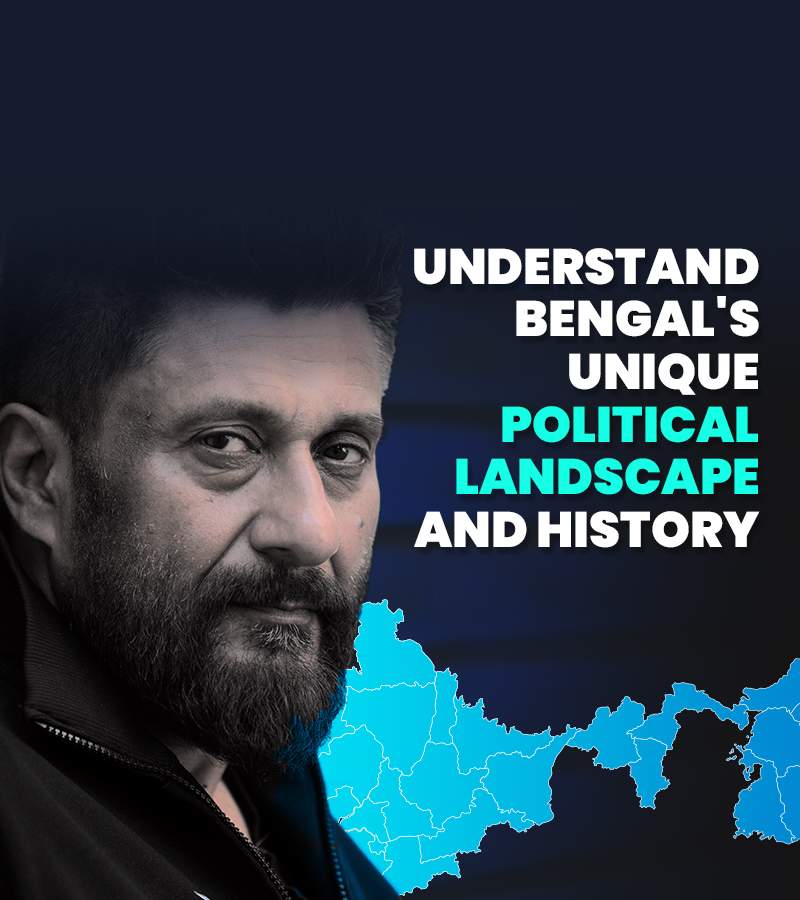

Unravelling Indian Politics: Insights from Vivek Agnihotri and Abhijit Iyer Mitra
Explore the intricate dynamics of Indian politics, the unique political landscape of West Bengal, and the profound impact of historical narratives as discussed by national-award-winning filmmaker Vivek Agnihotri and political commentator Abhijit Iyer Mitra.
In an engaging conversation between filmmaker Vivek Ranjan Agnihotri and political commentator Abhijit Iyer Mitra, the complexities of Indian politics and West Bengal’s political landscape were discussed. In this article, we dissect their discussion to explore the nuances of electoral strategies, voter behaviour, and the interplay of historical narratives in shaping contemporary India.
The Complexity of Indian Elections
Indian elections are a spectacle of democracy, marked by intricate strategies and diverse voter bases. Agnihotri and Mitra shed light on political parties’ sophisticated tactics to sway voters. Social media and data analytics have transformed campaigning into a more personalised and data-driven affair. Political parties now tailor their messages to resonate with different demographics, leveraging technology to understand and influence voter behaviour.
Grassroots movements play a crucial role in this landscape. Agnihotri and Mitra emphasise mobilising local communities and addressing their immediate concerns. This grassroots approach, combined with the use of social media, allows political parties to create a more direct and impactful connection with voters.
Understanding voter behaviour is critical to deciphering Indian elections. The conversation highlights how caste, religion, and economic status influence voting patterns. These factors often intersect, creating a complex voter base that political parties must navigate carefully. Economic policies and welfare schemes are significant determinants of voter preferences. While identity politics is crucial, the promise of economic development and social welfare can be decisive in elections. Mitra discusses how political parties must balance addressing identity-based issues with offering tangible financial benefits to win over voters.
The Importance of Data in Modern Campaigns
One of the critical aspects of modern election campaigns is the use of data analytics. Agnihotri and Mitra discuss how political parties gather and analyse data to understand voter preferences and tailor their campaigns accordingly. This data-driven approach allows parties to identify key issues that resonate with specific voter segments and craft targeted messages to address these concerns.
For example, in regions where unemployment is a significant issue, political parties may focus on job creation and economic development in their campaigns. In areas with substantial rural populations, promises related to agricultural subsidies and support might take centre stage. This strategic use of data helps parties connect with voters more personally, increasing their chances of electoral success.
Voter Engagement and Mobilization
Beyond data analytics, the conversation also highlights the importance of voter engagement and mobilisation. Agnihotri and Mitra emphasise the need for political parties to actively engage with voters through various channels, including social media, public rallies, and community events. This engagement helps build trust and credibility, which is essential for gaining voter support.
Mobilising voters, particularly in rural and remote areas, is another critical aspect of election campaigns. Agnihotri and Mitra discuss how political parties deploy volunteers and local leaders to reach out to voters, address their concerns, and encourage them to participate in the electoral process. This grassroots mobilisation is crucial for ensuring high voter turnout and securing electoral victories.
Bengal’s Political Turmoil
Bengal’s political landscape is rich in history and cultural identity. Agnihotri and Mitra explore the state’s political evolution from the colonial era to the present, highlighting fundamental movements and leaders. They underscore the influence of Bengal’s intellectual and artistic communities on its political discourse, creating a vibrant yet complex political environment.
The discussion delves into the current political dynamics in Bengal, focusing on the recent elections and the strategies of major political players. The Trinamool Congress and the Bharatiya Janata Party are at the forefront, each employing unique tactics to consolidate their positions. The challenges of navigating Bengal’s solid regional identities and legacy of political activism are also discussed.
The Role of Intellectuals and Artists in Bengal’s Politics
Bengal has a long history of intellectual and artistic contributions that have shaped its political landscape. Agnihotri and Mitra discuss how the state’s intellectuals and artists have significantly influenced political discourse and public opinion. From the Bengal Renaissance to the contemporary period, Bengal’s intellectual community has been at the forefront of social and political change.
This intellectual tradition has created a political environment that values debate, critical thinking, and cultural expression. Agnihotri and Mitra highlight how political parties in Bengal often engage with intellectuals and artists to gain support and legitimacy. This engagement helps parties connect with the electorate’s educated and culturally conscious segments, further enriching the political discourse.
The Impact of The Delhi Files
The Delhi Files serves as a focal point for discussing the role of historical narratives in shaping public discourse. Agnihotri shares his motivations behind the film, emphasising the importance of revisiting history to understand contemporary issues. The film aims to spark debate about overlooked or misrepresented historical events, contributing to a broader understanding of India’s past.
Agnihotri also provides insights into his current challenges while producing The Delhi Files. These include securing funding, navigating political pressures, and balancing artistic expression with historical accuracy. The ethical considerations of depicting sensitive historical events are highlighted, reflecting filmmakers’ responsibility in shaping public opinion.
Revisiting Historical Narratives
One of the key themes of The Delhi Files is the need to revisit and re-examine historical narratives. Agnihotri and Mitra discuss how the victors often write history, leading to biased and incomplete accounts of events. The Delhi Files aims to provide a more balanced and accurate portrayal of historical events, challenging existing narratives and prompting viewers to think critically about the past.
This re-examination of history is critical in a diverse and multicultural society like India. Agnihotri and Mitra emphasise that understanding the complexities of history can help address contemporary social and political issues. By shedding light on forgotten or overlooked events, The Delhi Files encourages viewers to engage in informed and meaningful discussions about India’s past and present.
Ethical Considerations in Historical Filmmaking
Agnihotri shares the ethical dilemmas he has been facing while making The Delhi Files. Depicting sensitive historical events requires carefully balancing artistic expression and historical accuracy. Agnihotri discusses the importance of conducting thorough research and consulting with historians to ensure the film’s credibility. Moreover, Agnihotri emphasises the responsibility of filmmakers to handle sensitive topics with care and respect. He discusses the challenges of portraying traumatic events and the need to avoid sensationalism. By approaching these topics with sensitivity and integrity, filmmakers can contribute to a more nuanced and empathetic understanding of history.
Conclusion
The conversation between Vivek Agnihotri and Abhijit Iyer Mitra offers a comprehensive look at Indian politics, the unique dynamics of Bengal, and the influence of historical narratives. Their insights provide valuable perspectives on the factors shaping India’s political landscape and the ongoing efforts to address diverse voter concerns. Understanding these intricacies is crucial for anyone interested in the democratic processes and cultural contexts of contemporary India.






